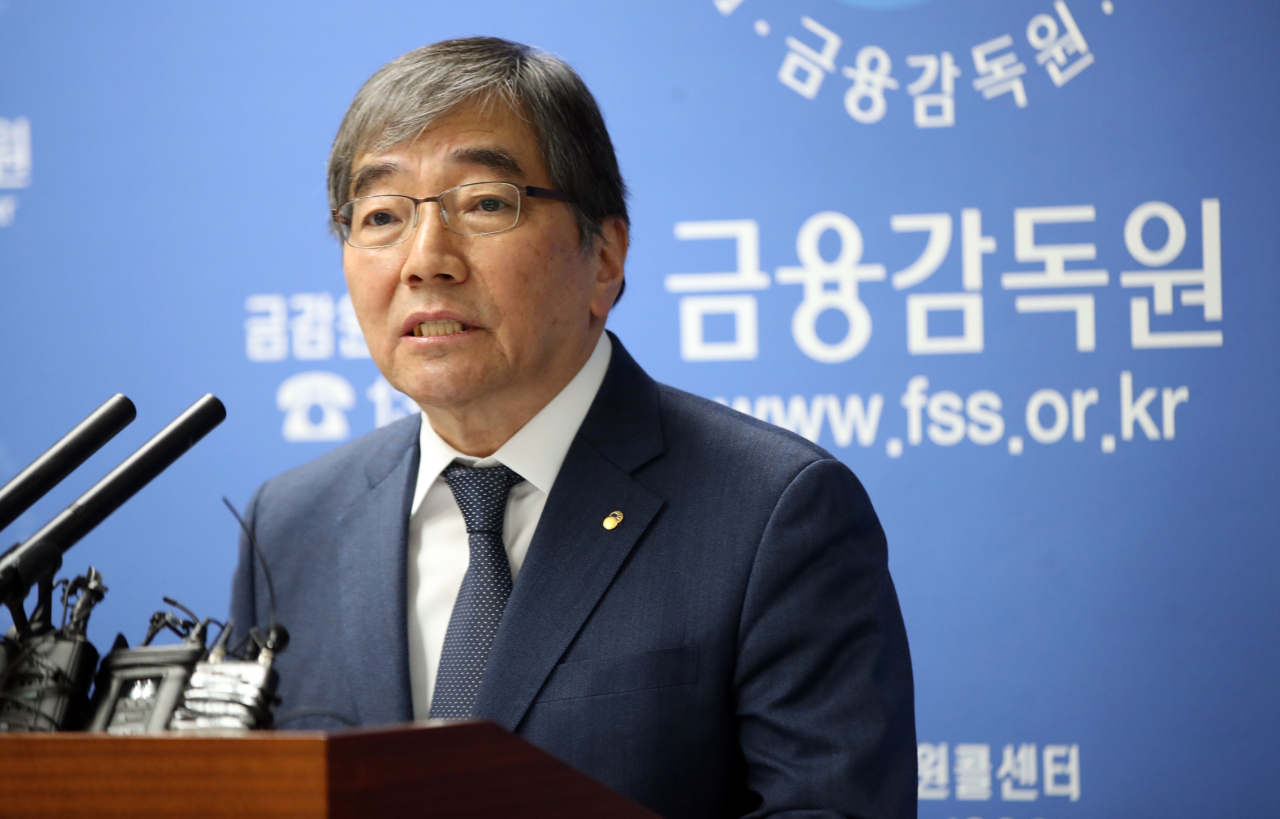‘Lime bad bank’ to start in May, sanction process in June: FSS chief
Financial watchdog probes Lime Asset’s DLF fiasco, warns retail investors to be cautious
By Bae HyunjungPublished : April 28, 2020 - 18:12

South Korea’s financial watchdog said Tuesday it plans to establish a bad bank in May to help companies recoup their losses from the troubled funds sold by Lime Asset Management.
Citing the recent buying binge by retail stock investors here, Financial Supervisory Service Gov. Yoon Suk-heun urged them to be cautious about the excessive preference for high-risk and high-return investments amid the low-growth, low-interest rate environment.
“During the remaining period of my term, the top priority task is to improve the (public’s) trust in the FSS,” he said, in a statement, marking the second anniversary of his inauguration.
Addressing lessons learned from dealing with major financial scandals -- such as Lime Asset’s flawed fund sales and massive short-selling of derivative-linked funds -- the watchdog vowed to set up a sustainable monitoring system.
Specifically looking at the Lime Asset fiasco, the FSS chief suggested that a bad bank is likely to kick off in May for follow-up measures and that the sanction process for the disputed asset manager will be announced in June.
“There seems to be dissension among some of the companies (involved) over the creation of an exclusive firm in charge of fund transfers, but I understand that adjustments will be made by May,” Yoon said.
“It is rational for the sake of clarity that Lime Asset should transfer its funds (to a separate unit) rather than holding on to them, and the bad bank method seems appropriate for the purpose.”
The sellers of Lime Asset’s funds have been working on creating a bad bank to clear away the 1.7 trillion won ($1.39 billion) worth of frozen assets.
“Once the bad bank kicks off, we may decide (on sanctions against Lime Asset) in the following month,” Yoon said.
Considering the amount of losses and the socioeconomic impacts of the case, market observers speculate that the asset manager will face heavy sanctions such as license revocation or business suspension.
Yoon also reiterated the need to impose sanctions on banking chiefs over the DLF fiasco.
“Even if I were to travel back in time to several months ago, I would still make the same decision,” he said.
In January, the FSS’ sanction panel approved reprimands against Sohn Tae-seung and Ham Young-joo, chiefs of Woori Bank and KEB Hana Bank, respectively, at the time of the disputed product sales.
Sohn, who was about to be reappointed as Woori Financial Group chairman, filed for an injunction. As the court upheld the request, he was reappointed for the second term and is currently seeking to have the sanction annulled.
Turning an eye to investors, Yoon raised the alarm against what he said was a rash move toward speculative investment.
“The pursuit of high risks and high returns is rampant in the market, as consumers yearn for higher returns and financial companies go along with it,” he said.
But in a market that is trapped in a cycle of low growth and interest rates, investments for short-term profits are likely to eventually lead to losses for retail investors, he said.
While urging retail investors to refrain from reckless investments, Yoon also called on financial companies to expand their mid-risk, mid-return product range to cater to market demand.
By Bae Hyun-jung (tellme@heraldcorp.com)



![[Exclusive] Korean military set to ban iPhones over 'security' concerns](http://res.heraldm.com/phpwas/restmb_idxmake.php?idx=644&simg=/content/image/2024/04/23/20240423050599_0.jpg&u=20240423183955)



![[Herald Interview] 'Amid aging population, Korea to invite more young professionals from overseas'](http://res.heraldm.com/phpwas/restmb_idxmake.php?idx=644&simg=/content/image/2024/04/24/20240424050844_0.jpg&u=20240424200058)


![[Pressure points] Leggings in public: Fashion statement or social faux pas?](http://res.heraldm.com/phpwas/restmb_idxmake.php?idx=644&simg=/content/image/2024/04/23/20240423050669_0.jpg&u=)








